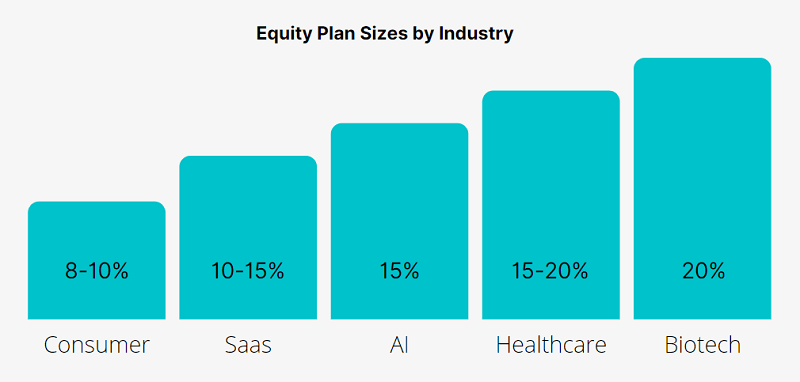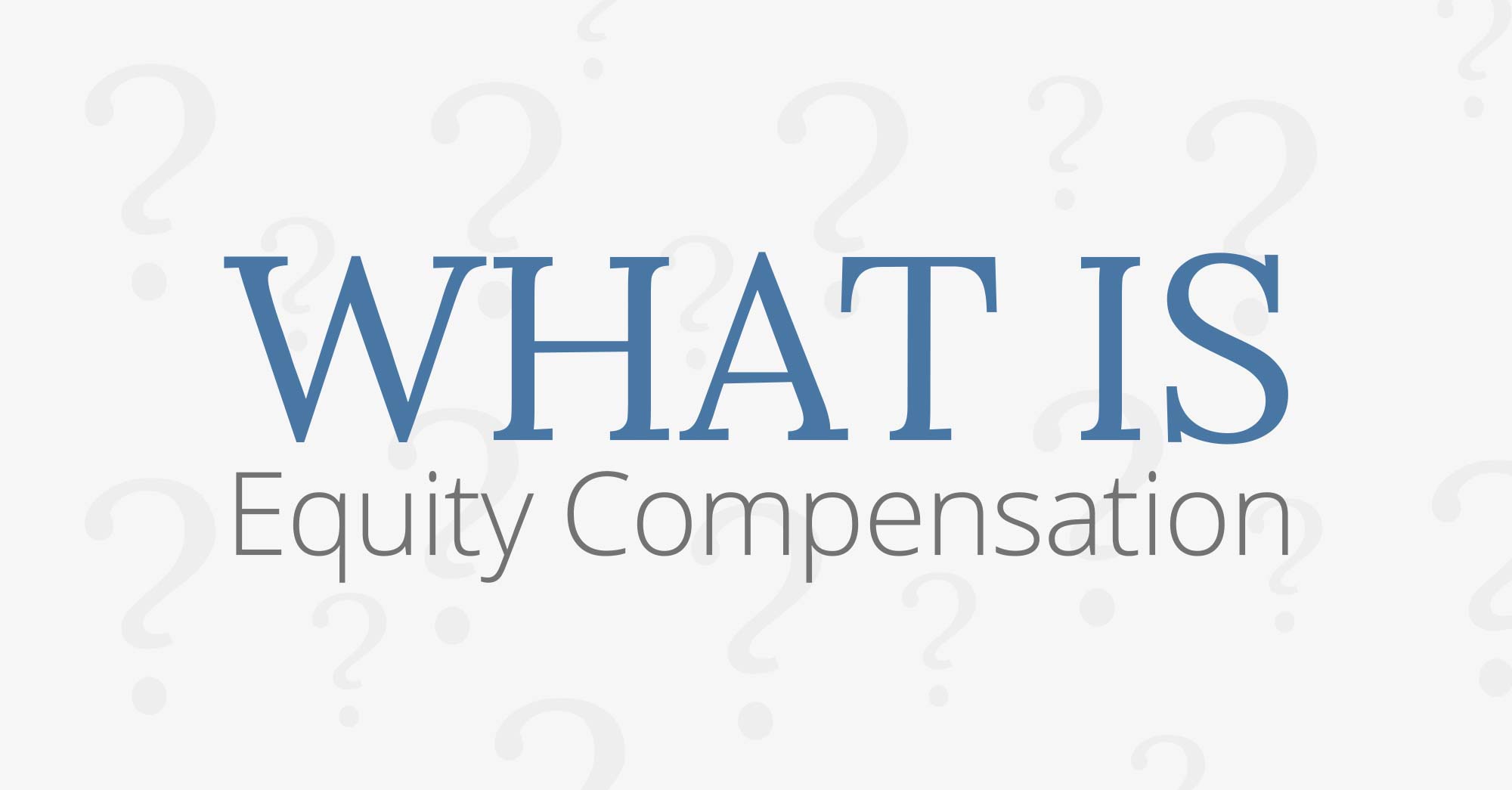Equity compensation, also known as share-based compensation, is a type of non-cash pay that a company offers to employees to partake in ownership of the firm. There’re many different equity compensation forms such as stock options and restricted stock units.
In this post, we’re going to discuss:
- Why equity compensation?
- Different types of equity compensation
- How does equity compensation work?
- How much equity to give employees?
- What happens to employee equity on termination?
- Potential problems with employee equity
Why equity compensation?
The major advantage of equity-based compensation is the financial considerations both for the employer and the employee. It allows employers to offer their employees more – which is great for the employees – while not affecting their bottom line – which is great for the employer. More equity compensation benefits:
- It helps attract and retain talent while remaining on solid financial ground. It is particularly useful for smaller companies that are just starting out, allowing them to offer employees a portion of their potential when they don’t have much cash to hand.
- Employers benefit from the alignment of their employees’ values with those of the company
- Employees have lower absenteeism and higher retention. They also work harder and are more productive as their performance impact how much they can earn.
- Employee equity compensation allows employees to have a feeling of team spirit – they’re not just employees, they’re employee-owners and can often make valuable contributions to the company’s direction through shareholder voting.
- Both the employer and the employee can enjoy tax benefits from some approved plans, e.g. SAYE and SIP
If you’re already convinced that equity compensation is right for you, then book a free consultation. Our experts will take you through the entire design and implementation process
Contact Us
Types of employee equity
Employee equity compensation comes in a wide variety of forms and plans – stock options, restricted stock units (RSU), employee share schemes and more. This post will discuss the following 5 types.
- Stock options – ISOs & NSOs
- Restricted stock – RSU & RSA
- Cash deferred bonus plans – SARs & Phantom stock
- Employee share schemes
Check how each works in the next section.
How does equity compensation work?
Equity compensation works by offering employees equity right away when they join the company or offering them a form where employees have to stay with the company for a certain amount of time to have full ownership of the stock. Let’s see how the following types of equity-based compensation work:
1. Stock options – ISOs & NSOs:
Stock options provide an employee with the right to purchase a certain number of shares at an initially agreed price after vesting (service-based or performance-based or both). Fewer taxes are (often) due for an ISO because no taxes are owed at the time of exercise while taxes are chargeable at exercise for NSOs.
Financing methods:
1. Cash from the employee’s pocket to purchase the options
2. Money made from the sale to cover the exercise costs in an exercise-and-sell-transaction
Suitable for many companies – early stage, high growth startups and publicly traded companies – who want to issue equity broadly or with a group of selected employees as a way to attract, retain, and/or motivate them.
Learn more stock options here
2. Restricted stock – RSU & RSA:
Restricted stock is a grant of shares to an employee. He/she can receive them only if a vesting requirement is met (service-based or performance-based or both). Participants may need to pay for the grants under RSA plans while they typically receive the grants for free under RSU plans.
Financing methods:
1. Cash from the employee’s pocket to purchase the grants
2. Stock from the company’s equity incentive pool
Suitable for many companies who want to offer equity broadly or with a group of selected employees as a way to attract, retain, and/or motivate them without requiring payment upfront. (RSA is commonly used by startups while RSU is by established companies)
Learn more about restricted stock (RSU & RSA) here
3. (Cash) deferred bonus plans – SARs & Phantom stock:
They’re the two types of stock plans that don’t really use stock but still reward employees with compensation that is tied to the company’s stock performance. So, participants are not shareholders and don’t have voting rights.
Once the vesting period is over, participants can get a cash equivalent or the actual stock. If you’re looking to offer plans with minimal risks for employees, they’re ideal because there is no purchase required, unlike stock options.
Suitable for many companies who want to offer employees compensation without requiring employees’ upfront payment and issuing a large number of extra shares.
Learn more about deferred bonuses here
4. Employee share schemes:
There’re 4 HM Revenue and Customs (HMRC) approved tax-advantaged share schemes in the UK. They’re Enterprise Management Incentive (EMI), Company Share Option Plan (CSOP), Save as you Earn (SAYE), and Share Incentive Plan (SIP)
Financing methods:
1. Employee’s income
2. Stock from the company’s equity incentive pool
Suitable for many companies who want to offer employees equity with tax benefits while enjoying corporation tax relief themselves. EMI is ideal for small
Learn more about employee share schemes here
How much equity to give employees?
Startups typically create employee equity plans that comprise 10–20% of the total equity of the company (50% for the founder(s) and 30-40% for investors). It’s similar to what David Steinberg – the founder of Zeta International, a strategic marketing company – recommended to us:
Steinberg recommends establishing a pool of about 10% for early key hires and 10% for future employees.
Let’s do some maths here now:
Generally speaking, if a startup business has a team of 10 people, the average equity given to employees is 1-2%. It’s not uncommon for first hires to get a greater equity share.

What happens to employee equity on termination
We get that.. the working relationship between you and your employee can get sour and you can no longer work together. That’s why a shareholder agreement comes into play.
The agreement should spell out the triggers, timing, and price for the repurchase of an employee’s stock. Let’s see some typical treatments when an employee leaves the company:
Stock Options: Typically, stock options expire within 90 days of leaving the company, so you could lose them if you don’t exercise your options. You may have a chance to exercise (i.e. purchase) them within the period or before you leave.
RSA / RSU: If your employees quit with vested RSA/RSU, typically the vested RSUs will stay theirs as they own company stock after vesting. For the unvested stock treatment, the unvested RSA shares are subjected to repurchase upon termination and the unvested RSU shares are likely forfeited.
Employee share schemes: Since each approved share scheme has different tax implications, check out their tax treatments here.
Potential problems with employee equity
Although equity-based compensation is getting popular and is widely used by different industries, the main disadvantage that we usually hear from companies hesitating to implement one is the matter of complexity.
- Equity compensation brings with it a lot of reporting and regulations to follow, as well as entire areas of jurisdiction and tax laws
- There is also a tremendous amount of work and thought that needs to be put into the design of the plan, e.g. how much equity to give away, participant eligibility, vesting schedule, period of the plan
- It may also cause extra workload to your existing departments due to tedious processes – everything from tracking and reporting changes in ownership to updating documents/policies/procedures, communicating with stakeholders, consulting your board of directors, and staying compliant.
Luckily, there’s an incredibly easy fix to this: Employee equity plan, simplified.
Looking to launch an equity compensation plan? Contact Global Shares today
With Global Shares’ award-winning combination of software and support, we take on all of the complexity and the hard work required for your equity compensation plan.
Our teams of experts will take you through Implementation, where we work with you to design and launch your plan, as well as the day-to-day business of maintaining and improving your plan after launch.
Our dynamic, customizable equity compensation software makes it easy for participants to view and manage their equity, but just in case, our multi-lingual Support Desk is always ready to answer any questions.
Contact Global Shares for a free demo today.
Please Note: This publication contains general information only and Global Shares is not, through this article, issuing any advice, be it legal, financial, tax-related, business-related, professional or other. The Global Shares Academy is not a substitute for professional advice and should not be used as such. Global Shares does not assume any liability for reliance on the information provided herein.








